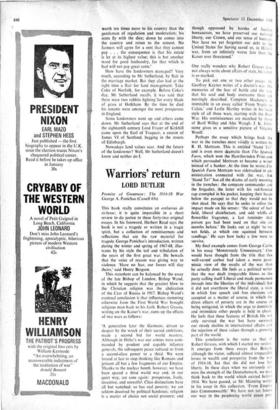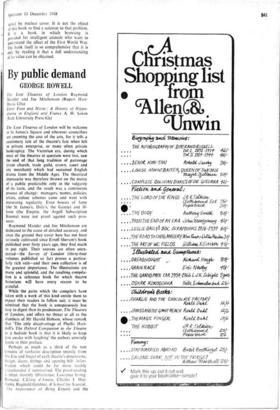Warriors return
LORD BUTLER
Promise of Greatness : The 1919-18 War George A. Panichas (Cassell 63s)
This book really constitutes an embarras de richesse; it is quite impossible in a short review to do justice to these forty-two original essays. In his foreword, Herbert Read says the book is not a tragedy or written in a tragic spirit, but a collection of reminiscences and reflections that are the raw material for tragedy. George Panichas's introduction, written during-the winter and spring of 1967-68, illus- trates by his style the toil and tribulation of the years of the first great war. He bewails that the voice of reason was giving way to violence. 'Have no fear, our forces will slay theirs,' said Henry Bergson.
This statenient can be balanced by the essay of the late Bishop of London, Bishop Wand, in which he suggests that the greatest blow to the Christian -religion was the abdication of the .Czar of Russia in 1917. Bishop Wand's eventual conclusion is that influences stemming otherwise from the First World War brought religious man back to his faith. Robert Graves, writing on the Kaiser's war, sums up the effects of two wars as follows: 'A generation later the Germans, driven to despair by the wreck of their sacred ambitions, made a second bid for world mastery. Although in Hitler's war our armies were com- manded by prudent and capable infantry generals, the subsequent peace reduced us from a second-class power to a third. We were forced at last to stop thinking like Romans and jettison all but a few fragments of our Empire. Thanks to the nuclear bomb, however, we have been spared a third world war and, in our quiet way, are sane again : prosperous, lively, inventive, and unrestful. Class distinctions have _ all but vanished; so has real poverty; we are seldom deceived by political handouts; religion is a matter of choice not social pressure; and though oppressed by hordes of faceless bureaucrats, we have preserved our national liberty, our Crown, and our sense of humour. Nor have we yet forgotten our debt to the United States for having saved us, in Hitler's war, from an infinitely worse fate than the Kaiser ever threatened.'
One really wonders why Robert Graves does not always write about affairs of state, his talent is so marked. .
To pick out one or two other essays. sir Geoffrey Keynes writes of a doctor's war. His memories of the fear of battle and the ■k ay that his soul and body overcame them are movingly described. Compton Mackenzie is inimitable in an essay called 'From Naples to Calais,' and Leslie Hartley writes in his lucid style of all three wars, starting with the Boer War. His reminiscences are matched by those of Basil Willey and Alec Waugh. J. K. John- stone gives, us a sensitive picture of Virginia Woolf. . - Perhaps the essay which, brings back the war in the -trenches most vividly is written by R. H. Mottram.. This is entitled 'Stand To!' and is even more dogmatic than The Spanish Farm, which won the Hawthornden Prize land which persuaded Mottram to become a write in-stead of a banker. ,At the time he wrotc,The Spanish Farm Mottra.m was, sidetracked in ad, ministration connected with .-the . war, . but 'Stand To!' has all the drama of early morning in the trenches: the company 'commander and the brigadier, the latter with his red-banded cap crumpled in his pocket, keeping their heads below the parapet so that they would not be shot dead. He says that he seeks to relive the impact made on his senses: 'the odour of beet field, liberal disinfectant, and odd whiffs: of flowerlike fragrance, a last reminder that poison gas had been used on that site-,six months before.' He looks out at night to -see wet fields, at which one squinted betweea sandbags.' He says how lucky a few were to survive.
My final example comes from George Catlin in his essay 'Monstrously Unnecessary.' .(The would have thought from •the title that this well-versed author had taken a more pessi- mistic view of the results of the, war than he actually does. He feels as a political writer that the war dealt irreparable blows .to- . the party calling itself Liberal and made permanent inroads into the liberties of the individual; but it did not overthrow the liberal state, a. state in, -which free speech and free elections are accepted as a matter of course, in which the direst effects of poverty are in the course of being mitigated, in which the urge to dominate and intimidate other people is held in check. He feels that these features of British life not only survived the war but have survived our steady decline. in international affairs and the rejection of these values through a growing part of the world. This conclusion is the same as that of Robert Graves, with which I started my review. It emerges from these essays that Britain. although the victor, suffered almost irreparable losses in wealth and prosperity from the war of 1914-18, but that she did not lose her liberty. In these days when we enviously ad- mire the strength of the Deutschemark, we may think back to the world which existed before 1914. We have passed, as Mr Manning writes in his essay •in this collection, 'From Empire into Commonwealth.' We have not yet found our way in the perplexing world peace pro- tected by nuclear cover. It is not the object of this book to find a solution to that problem. it is a book in which browsing is provided for intelligent animals who want to understand the effect of the First World War. The book itself is so comprehensive that it is only by reading it that a full understanding of its value can be obtained.















































 Previous page
Previous page